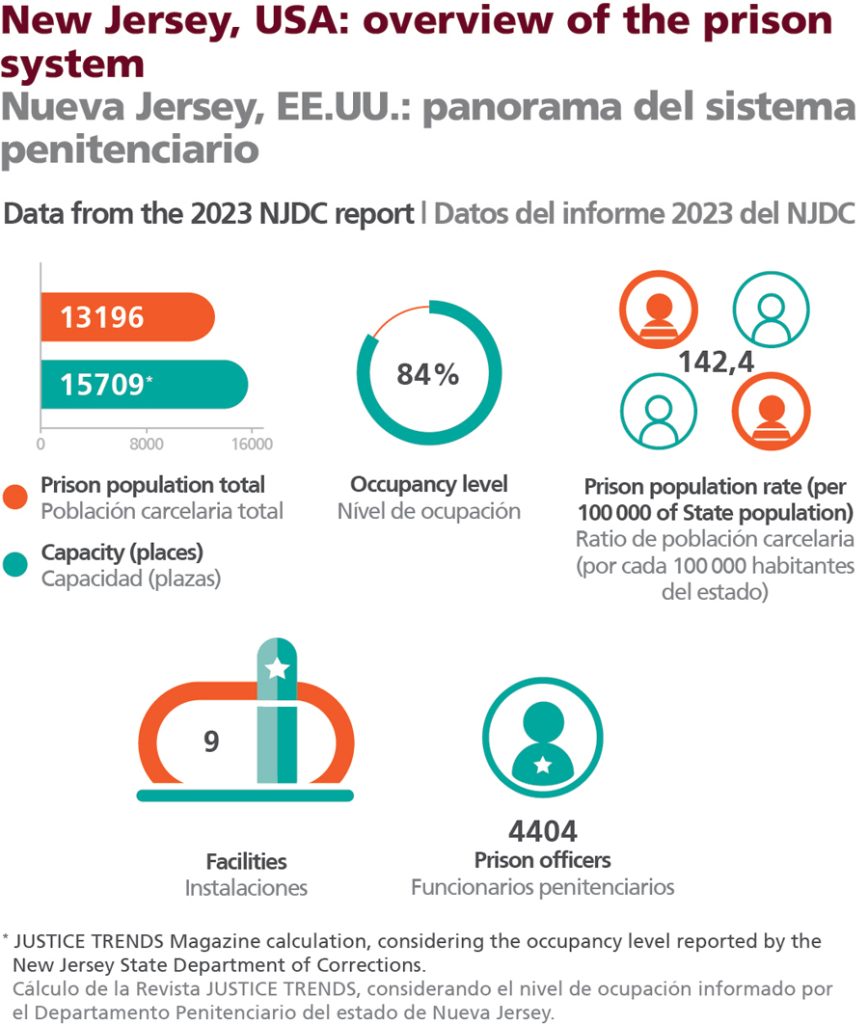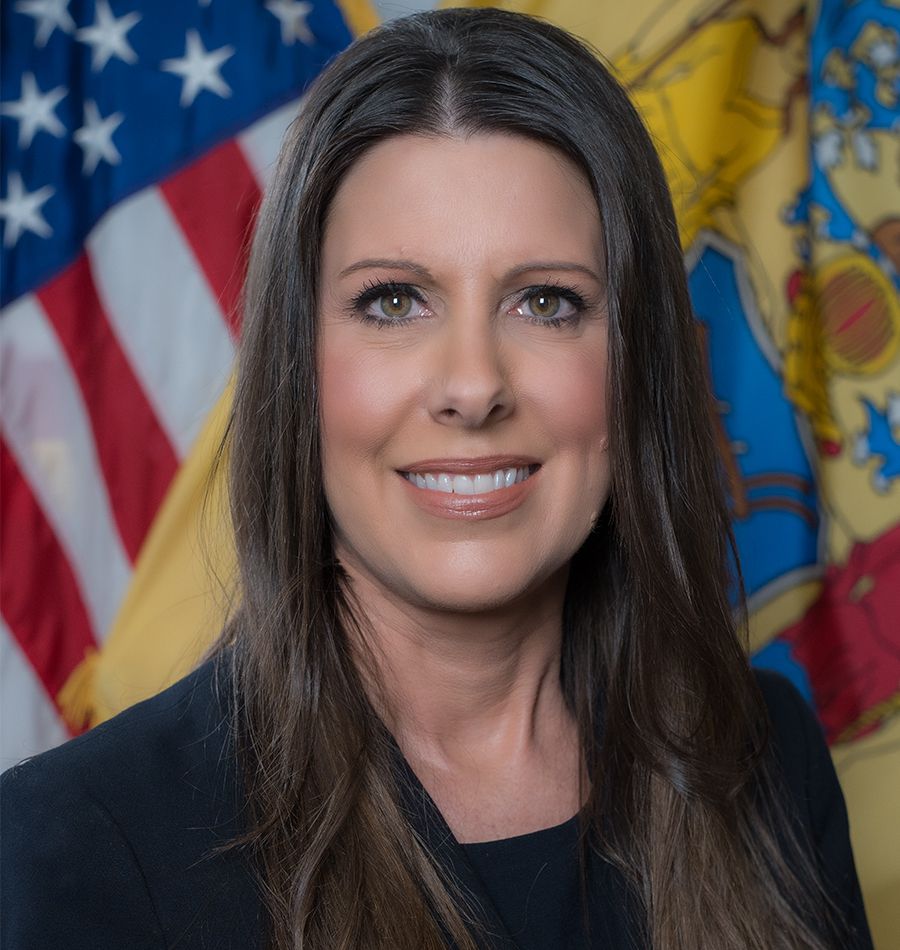Interview
Victoria L. Kuhn
Commissioner of the New Jersey Department of Corrections, United States of America
JT: When you were appointed Commissioner in 2022, you expressed your commitment to a holistic offender rehabilitation strategy. Investing in the Department’s staff and their well-being was another important goal for your administration.
What progress has been achieved in these two fundamental spheres for the success of the Department of Corrections mission?
VK: Upon assuming the role of Commissioner of the New Jersey Department of Corrections, I clearly articulated my priorities – advancing meaningful prison reform and promotion of reintegration initiatives.
For me, it was getting “back to the basics” of corrections – ensuring dignity and safety for those incarcerated and reinvesting in our staff and their wellness.
Both issues are tied intrinsically together; a professional, dedicated, and well-trained workforce is critical to operations and improving the lives of the individuals within our custody through the delivery of services and programmes for the successful rehabilitation and re-entry to the community.
As part of our commitment to reform, the Department embarked on adopting a new mission statement that defined our priorities and vision for a modern correctional agency.
We solicited input from staff across the agency and held workshops to ensure the new mission was a Department-wide effort.
A mission statement, however, is only words on a page without actions to support the purpose and values it represents. Since that time, progress has been made on a number of those priorities – we have established the Division of Programmes and Reintegration Services as a core function of the Department and empowered community organisations to develop new re-entry programmes through a grant programme.
We re-established the Board of Trustees at Edna Mahan Correctional Facility (EMCF) – New Jersey’s only female prison – comprised of advocates for women’s rights, advocates for diversity and transgender issues, justice-involved women, and educators to guide the Department’s decision-making process.
The reform measures that have been instituted over the past three years are now permanent and routine, including trauma- and gender-informed training, the formation of the Special Victims Unit to investigate allegations of sexual violence, and the availability of trauma programmes for the incarcerated population.
Most recently, the Department has made significant progress toward the closure of EMCF. In October 2023, the first phase of the closure was accomplished and half of the physical facility at Edna, specifically the minimum facility, was closed.
In addition, a “State Female Facility Working Group” made up of critical partners from across State government continues to diligently work through the many phases of review and planning in preparation for the construction of a new, modern, purpose-built female correctional facility.
None of these reforms is possible without the dedication of our staff. While there remains work to do, and it will take time to return to sufficient staffing levels, the Department’s recruitment and retention are trending in the right direction.
At the end of 2024, the State settled the collective bargaining agreement that improved the competitiveness of salaries in our custody ranks. We also launched the first employee climate and engagement survey that enabled staff voices to be heard and launched new Diversity, Equity and Inclusion (DEI) programmes and events, such as the first Black Leadership Summit, the first Women’s Leadership Summit, the first Men’s Health Summit, and the first DEI senior-level training. We continue to make significant investments in training at all levels throughout this agency.
Over the course of the last three years, these initiatives have reduced the attrition rate for officers from an average of 26 officers per pay period to about 11 officers per pay period. Our Academy class sizes continue to grow each year, and this past February, the Academy graduated the most recruits since 2019.

Aside from those mentioned, what other issues have been your
priorities, and how are you addressing them?
VK: A continuing theme for my administration is the importance of strategic planning and ensuring that we maintain and improve our facilities.
The Department continues to invest in infrastructure that contributes to the current health and safety of staff and incarcerated persons, while also advancing projects that foster reintegration through education, vocational, and social service programmes.
Similar to correctional agencies across the country, we continue to face challenges of contraband, including the uniqueness of synthetic drugs entering facilities on paper and mail. NJDOC continues to invest in technology that offers proactive, preventative, and layered approaches to prevent the infiltration of drugs into prisons.
Most recently, the New Jersey Department of Corrections became the second statewide corrections agency in the country to equip and deploy body-worn cameras in all correctional facilities and specialised units.
The deployment of body-worn cameras improves our accountability measures, preserves evidence, and aids in resolving investigations more quickly.
These cameras help the Department protect the staff, the incarcerated population, and those who visit our institutions.
We know that technological advances move quickly, and are pursuing the expansion of limited internet and Wi-Fi access in our facilities. This will allow incarcerated persons greater access to online learning, a powerful tool that can open doors to new opportunities and help them become comfortable using modern technology, instilling a sense of hope and motivation.
The Department continues to explore, develop, and implement mitigation efforts to reduce violence, develop programmes that reward positive and pro-social behaviour and reinforce a zero-tolerance policy for aggressive conduct, all to promote pro-social behaviour.

JT: New Jersey has recently reached an inflexion point on its decade-long downward trend in incarceration rates. After a decrease that reached under 12,500 inmates across the State’s correctional institutions, 2023 saw that number increase to 13,196 incarcerated persons.
What factors contribute to this change, and is it reversible? What
role can the Department play in implementing policies towards
reducing incarceration?
VK: A number of factors, primarily the expiration of COVID-era Pandemic Emergency Health Credit releases and the suspension of court proceedings, contributed to recent population reductions. Last year, we anticipated ending 2023 with a population near 14,000. Fortunately, that trend has slowed, and the population is steady at approximately 13,000. We expect that number to stabilise and continue to increase slightly as those in our custody serve longer sentences for more violent crimes.
The New Jersey Department of Corrections is committed to community safety, and this commitment is reflected in our record-low readmission rate. Currently, only 4% of the population who have been released after serving their sentence have been readmitted for a new criminal conviction.
This achievement is a result of the services being offered to the population, by our Division of Programmes and Reintegration Services and in collaboration with our expanding number of community organisations.
These initiatives, ranging from programming, education, and job readiness, to medical, mental health, and substance abuse treatment, are successfully preparing individuals for return to the community. They are not only transforming their own lives but also contributing to the strengthening of community safety.

In the context of prison and probation modernisation, what
advances supporting the mission of the Department of Corrections
would you highlight?
VK: Looking to advance and modernise corrections, it is critical to expand the accessibility of mental healthcare, trauma-informed programmes, and self-harm prevention initiatives for the incarcerated population. This is essential for the rehabilitation of justice-involved individuals.
The mental health crisis is a significant contributing factor that leads to individuals becoming incarcerated. It is crucial to encourage incarcerated persons to seek the help they need and to remove the stigma associated with receiving help. Simultaneously, it is vital to ensure that services and clinical help are available when demanded.
Looking on the horizon, the goals for the Department and my administration are the same as they were three years ago: continue to reshape our institutions to meet the evolving needs of those in our custody, develop and expand innovative programmes to support reintegration, ensure all individuals are treated with dignity and respect, and to continue to invest in our staff.
Victoria L. Kuhn
Commissioner of the New Jersey Department of Corrections, USA
Victoria L. Kuhn, Esq, is the Commissioner of the New Jersey Department of Corrections, and the first woman to head New Jersey’s largest law enforcement agency. With more than 24 years as an attorney with the State of New Jersey, Commissioner Kuhn has deep experience with criminal justice, corrections, anti-discrimination, labour law and public policy. Her career began as an Assistant Prosecutor, before transitioning to the Office of the Attorney General – Division of Law, where she addressed law enforcement and corrections matters. Before she was appointed Commissioner, Kuhn served as NJDOC’s Chief of Staff, and previously as the Deputy Chief of Staff, where she spearheaded several initiatives.
Advertisement



